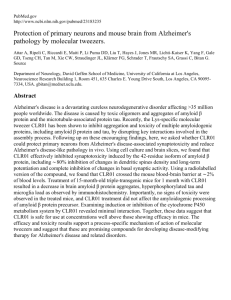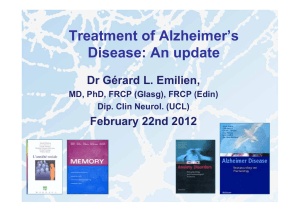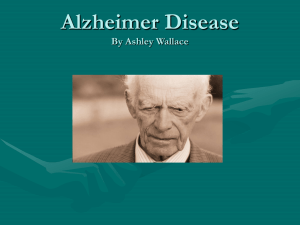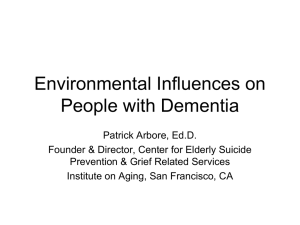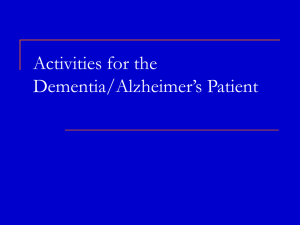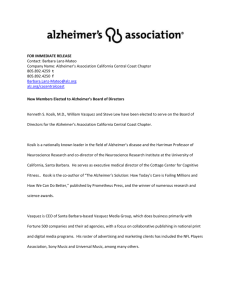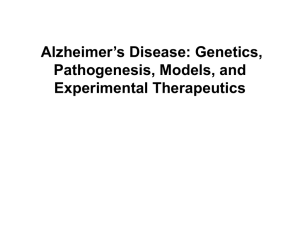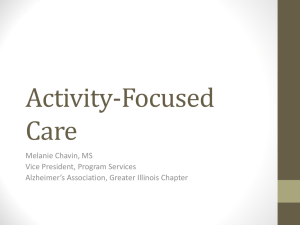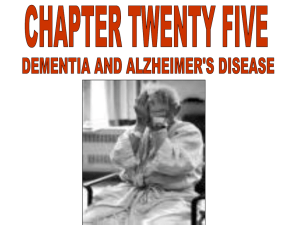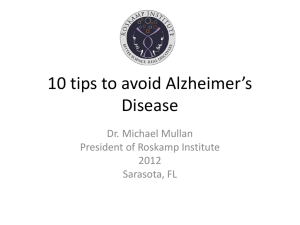The Brain and Alzheimer`s Disease
advertisement
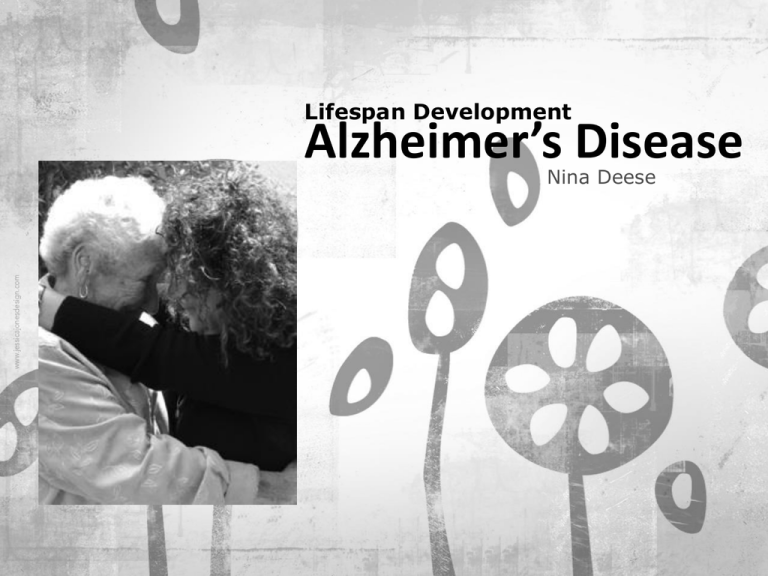
Lifespan Development Alzheimer’s Disease Nina Deese Announcement • Psychology Club is visiting HOPE LODGE tonight -Meet in front of Addlestone Library at 6:00pm -We will be playing bingo with the residents Agenda: 1.What is Dementia? What is Alzheimer’s Disease? 2.Statistics for the U.S. 3.Stages of AD 4.The Brain and Alzheimer’s 5.Causes 6.Risk/Protective Factors 7.Other forms of dementia… How are they different from Alzheimer’s? Development of Dementia The pathological loss of brain function is known as dementia—literally “out of mind”, referring to severely impaired judgment dementia 1. irreversible loss of intellectual functioning caused by organic brain damage or disease 2. becomes more common with age, but it is abnormal and pathological even in the very old Alzheimer’s Disease • First described by German psychiatrist -Alois Alzheimer (1906) • Generally diagnosed in people over 65 years of age -Early-onset (before 65); only 5-10% of patients -Several genetic causes • 4.5+ million Americans suffer from it -5% of 65-74 years of age -Nearly 50% of 85+ • 1 in 6 women over 55; 1 in 10 men over 55 http://www.youtube.com/watch?v=9Wv9jrk-gXc Symptoms of pre-dementia • Early symptoms similar to age-related or stress-induced memory loss Difficulty remembering recently learned facts • Subtle cognitive difficulties Executive function of attentiveness Planning, flexibility Abstract thinking • Impairment in semantic memory New memory formation • Mild confusion/Apathy • As early as 5-10 years (some say 20 years) before official diagnosis Mild Alzheimer’s Disease • Memory loss for recent events hard time remembering newly learned information • Difficulty with problem solving, complex tasks and sound judgments tasks such as planning a family event or balancing a checkbook become overwhelming, often experience lapses in judgment • Changes in personality may become withdrawn, irritable, or angry when unexpected, decreased attention span • Difficulty organizing and expressing thoughts • Getting lost or misplacing belongings common to lose or misplace things, trouble finding way around http://www.mayoclinic.com/health/alzheimers-stages/AZ00041 Moderate Alzheimer’s Disease • Showing increasingly poor judgment and deepening confusion lose track of where they are, confuse friends and family members, and often wander • Experience even greater memory loss may be unable to recall addresses, phone numbers, stories • Need help with some daily activities • Undergo significant changes in personality and behavior not uncommon to develop unfounded suspicions, hear or see things, grow restless and agitated, may bite, kick, scream, etc. http://www.mayoclinic.com/health/alzheimers-stages/AZ00041 http://www.mayoclinic.com/health/alzheimers-stages/AZ00041 Severe Alzheimer’s Disease • Lose the ability to communicate coherently • Require daily assistance with personal care total assistance with dressing, eating, etc. • Experience a decline in physical abilities http://www.alz.org/alzheimers _disease_4719.asp unable to walk, get up, or hold up one’s head The Brain and Alzheimer’s Disease Two major structural changes: 1. Neurofibrillary tangles Bundles of twisted threads that are the product of collapsed neural structures (contain abnormal forms of tau protein 2. Amyloid plaques Dense deposits of deteriorated amyloid protein, surrounded by clumps of dead nerve and glial cells tangle plaques http://www.alz.org/brain/14.asp http://www.ahaf.org/alzheimers/about/understanding/brain-with-alzheimers.html Apple Pen Tie House Car Causes? Several competing hypotheses: Cholinergic hypothesis -Caused by reduced synthesis of acetylcholine -Destruction of these neurons causes disruptions in distant neuronal networks (perception, memory, judgment) Amyloid hypothesis -Abnormal breakdown; buildup of amyloid beta deposits -Damaged amyloid proteins build to toxic levels, causing call damage and death Tau hypothesis -Caused by tau protein abnormalities -Formation of neurofibrillary tangles Risk Factors • • • • • Obesity High blood pressure Head trauma High cholesterol Being American! – Higher rates in • Japanese-Americans than Japanese • African-Americans than Africans • Depression • Lower rates in highly educated – Beneficial consequences of learning and memory Possible Protective Factors • Education The ability of the brain to change suggests to some that staying mentally active as you age may help to maintain healthy brain synapses. A 2002 study reported an association between frequent participation in cognitively stimulating activities (such as reading, doing crossword puzzles, visiting museums) and a reduced risk for Alzheimer's. • Exercise Lowers risk of high blood pressure and other risk factors associated with Alzheimer’s • Alcohol Consumption Men who consume one to three drinks of alcohol per day cut their risk of developing the disease by nearly half. Among women, however, the risk was reduced by only 4%. The type of alcohol had no effect on the results. But further study is needed. In the meantime, experts do not recommend drinking alcohol to fend off Alzheimer's disease. Source: Harvard Health Publication Other forms of Dementia • Subcortical Dementias – Forms of dementia that begin with impairments in motor ability and produce cognitive impairment in later stages • Parkinson’s disease, Huntington’s disease, and Multiple Sclerosis are subcortical dementias • Reversible Dementia – dementia caused by medication, inadequate nutrition, alcohol abuse (Korsakoff’s Syndrome), depression, or other mental illness can sometimes be reversed Self-Quiz: Alzheimer’s Disease 1. Apple was on the list. TRUE 1. Home was on the list. FALSE 2. Which of these were not on the list? • Banana • Pen • Car • House • Tie What’s Normal What’s Not Forgetting your ATM number or where you parked. Forgetting what an ATM card is or what kind of car you own. Forgetting what you were about to say Forgetting how to do an everyday task, like writing a check. Forgetting which day of the week you had a dental appointment Getting lost in your own neighborhood. Misplacing of losing your keys or phone Putting the ice tray in the oven instead of the freezer Forgetting the name of the Forgetting who your family person who sits in front of members are you in class Thank you! HAVE A HAPPY THANKSGIVING BREAK!

